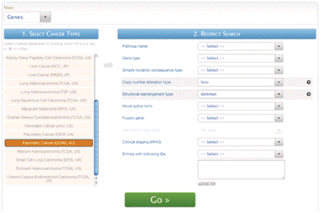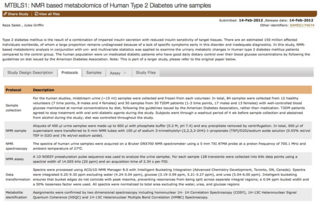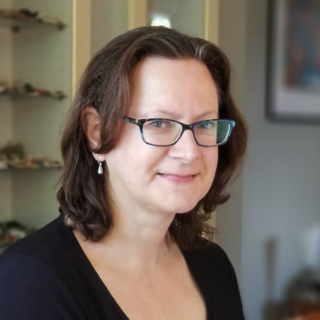
Bioinformatics is an interdisciplinary field of science that develops methods and software tools for understanding biological data, especially when the data sets are large and complex. Bioinformatics uses biology, chemistry, physics, computer science, computer programming, information engineering, mathematics and statistics to analyze and interpret biological data. The process of analyzing and interpreting data can some times referred to as computational biology, however this distinction between the two terms is often disputed. To some, the term computational biology refers to building and using models of biological systems.

Eugene Viktorovich Koonin is a Russian-American biologist and Senior Investigator at the National Center for Biotechnology Information (NCBI). He is a recognised expert in the field of evolutionary and computational biology.

Metagenomics is the study of genetic material recovered directly from environmental or clinical samples by a method called sequencing. The broad field may also be referred to as environmental genomics, ecogenomics, community genomics or microbiomics.
The Open Biological and Biomedical Ontologies (OBO) Foundry is a group of people who build and maintain ontologies related to the life sciences. The OBO Foundry establishes a set of principles for ontology development for creating a suite of interoperable reference ontologies in the biomedical domain. Currently, there are more than a hundred ontologies that follow the OBO Foundry principles.

Barend Mons is a molecular biologist and a FAIR data specialist. The first decade of his scientific career he spent on fundamental research on malaria parasites and later on translational research for malaria vaccines. In the year 2000 he switched to advanced data stewardship and (biological) systems analytics. He is most known for innovations in scholarly collaboration, especially nanopublications, and knowledge graph based discovery.

Metadata is "data that provides information about other data", but not the content of the data itself, such as the text of a message or the image itself. There are many distinct types of metadata, including:
Open scientific data or open research data is a type of open data focused on publishing observations and results of scientific activities available for anyone to analyze and reuse. A major purpose of the drive for open data is to allow the verification of scientific claims, by allowing others to look at the reproducibility of results, and to allow data from many sources to be integrated to give new knowledge.
The PhenX Toolkit is a web-based catalog of high-priority measures related to complex diseases, phenotypic traits and environmental exposures. These measures were selected by working groups of experts using a consensus process. PhenX Toolkit's mission is to provide investigators with standard measurement protocols for use in genomic, epidemiologic, clinical and translational research. Use of PhenX measures facilitates combining data from a variety of studies, and makes it easy for investigators to expand a study design beyond the primary research focus. The Toolkit is funded by the National Human Genome Research Institute (NHGRI) of the National Institutes of Health (NIH) with co-funding by the Office of the Director (OD), the National Institute of Neurological Disorders and Stroke (NINDS), and the National Heart, Lung, and Blood Institute (NHLBI). Continuously funded since 2007, PhenX has received funding from a variety of NIH institutes, including the National Institute on Drug Abuse (NIDA), the National Institute on Mental Health (NIMH), the National Cancer Institute (NCI) and the National Institute on Minority Health and Health Disparities (NIMHD). The PhenX Toolkit is available to the scientific community at no cost.

BioMart is a community-driven project to provide a single point of access to distributed research data. The BioMart project contributes open source software and data services to the international scientific community. Although the BioMart software is primarily used by the biomedical research community, it is designed in such a way that any type of data can be incorporated into the BioMart framework. The BioMart project originated at the European Bioinformatics Institute as a data management solution for the Human Genome Project. Since then, BioMart has grown to become a multi-institute collaboration involving various database projects on five continents.

Yoshinori Ohsumi is a Japanese cell biologist specializing in autophagy, the process that cells use to destroy and recycle cellular components. Ohsumi is a professor at Tokyo Institute of Technology's Institute of Innovative Research. He received the Kyoto Prize for Basic Sciences in 2012, the 2016 Nobel Prize in Physiology or Medicine, and the 2017 Breakthrough Prize in Life Sciences for his discoveries of mechanisms for autophagy.

Alfonso Valencia is a Spanish biologist, ICREA Professor, current director of the Life Sciences department at Barcelona Supercomputing Center, of Spanish National Bioinformatics Institute (INB-ISCIII), and coordinator of the data pillar of the Spanish Personalised Medicine initiative, IMPaCT. From 2015 to 2018, he was President of the International Society for Computational Biology.

MetaboLights is a data repository founded in 2012 for cross-species and cross-platform metabolomic studies that provides primary research data and meta data for metabolomic studies as well as a knowledge base for properties of individual metabolites. The database is maintained by the European Bioinformatics Institute (EMBL-EBI) and the development is funded by Biotechnology and Biological Sciences Research Council (BBSRC). As of July 2018, the MetaboLights browse functionality consists of 383 studies, two analytical platforms, NMR spectroscopy and mass spectrometry.
Machine learning in bioinformatics is the application of machine learning algorithms to bioinformatics, including genomics, proteomics, microarrays, systems biology, evolution, and text mining.

FAIR data is data which meets the FAIR principles of findability, accessibility, interoperability, and reusability (FAIR). The acronym and principles were defined in a March 2016 paper in the journal Scientific Data by a consortium of scientists and organizations.
Nanoinformatics is the application of informatics to nanotechnology. It is an interdisciplinary field that develops methods and software tools for understanding nanomaterials, their properties, and their interactions with biological entities, and using that information more efficiently. It differs from cheminformatics in that nanomaterials usually involve nonuniform collections of particles that have distributions of physical properties that must be specified. The nanoinformatics infrastructure includes ontologies for nanomaterials, file formats, and data repositories.

Elisabeth Margaretha Harbers-Bik is a Dutch microbiologist and scientific integrity consultant. Bik is known for her work detecting photo manipulation in scientific publications, and identifying over 4,000 potential cases of improper research conduct. Bik is the founder of Microbiome Digest, a blog with daily updates on microbiome research, and the Science Integrity Digest blog.
Biocuration is the field of life sciences dedicated to organizing biomedical data, information and knowledge into structured formats, such as spreadsheets, tables and knowledge graphs. The biocuration of biomedical knowledge is made possible by the cooperative work of biocurators, software developers and bioinformaticians and is at the base of the work of biological databases.

Laurie A. Boyer is an American biologist who is a Professor at the Massachusetts Institute of Technology. Her research focuses on the regulation of cell fate decisions and how faulty regulation leads to disease using human stem cells and mice as models.
European Genome-phenome Archive (EGA) is a repository for human biomolecular and phenotypic data in the United Kingdom and Spain. It involves the secure storage of all potentially identifiable genetic data, phenotypic and clinical data generated by biomedical research programs.

Christina Curtis is an American scientist who is a Professor of Medicine, Genetics and Biomedical Data Science and an Endowed Scholar at Stanford University where her research investigates the evolution of tumors. She is director of Artificial Intelligence and Cancer Genomics at Stanford University School of Medicine and is on the board of directors of the American Association for Cancer Research.













